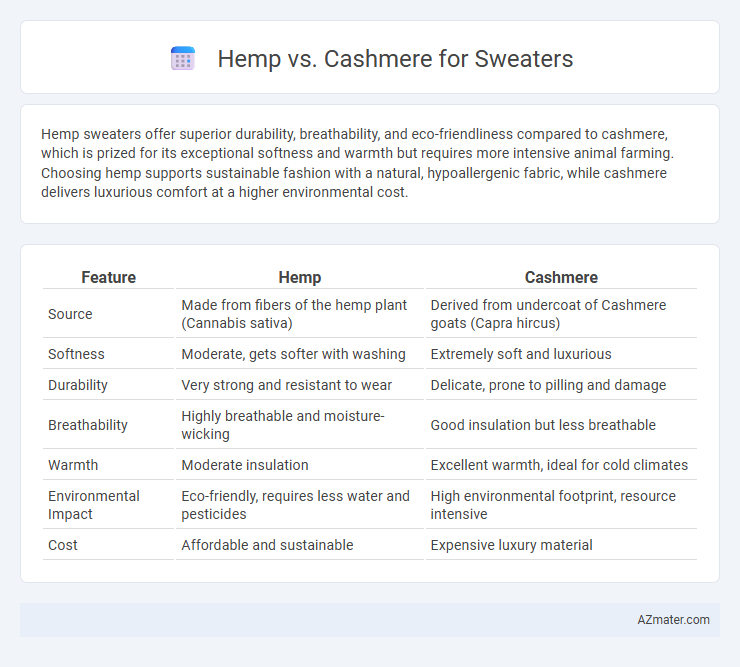Hemp sweaters offer superior durability, breathability, and eco-friendliness compared to cashmere, which is prized for its exceptional softness and warmth but requires more intensive animal farming. Choosing hemp supports sustainable fashion with a natural, hypoallergenic fabric, while cashmere delivers luxurious comfort at a higher environmental cost.
Table of Comparison
| Feature | Hemp | Cashmere |
|---|---|---|
| Source | Made from fibers of the hemp plant (Cannabis sativa) | Derived from undercoat of Cashmere goats (Capra hircus) |
| Softness | Moderate, gets softer with washing | Extremely soft and luxurious |
| Durability | Very strong and resistant to wear | Delicate, prone to pilling and damage |
| Breathability | Highly breathable and moisture-wicking | Good insulation but less breathable |
| Warmth | Moderate insulation | Excellent warmth, ideal for cold climates |
| Environmental Impact | Eco-friendly, requires less water and pesticides | High environmental footprint, resource intensive |
| Cost | Affordable and sustainable | Expensive luxury material |
Introduction: Hemp vs Cashmere Sweaters
Hemp sweaters offer exceptional durability, breathability, and natural resistance to mold and UV rays, making them ideal for sustainable fashion. Cashmere sweaters provide luxurious softness, warmth, and lightweight comfort due to fine fibers harvested from cashmere goats. Choosing between hemp and cashmere depends on preferences for eco-friendliness versus premium softness and insulation.
Material Origins and Sustainability
Hemp fibers originate from the stalks of the Cannabis sativa plant, known for fast growth with minimal water and pesticide use, making it an eco-friendly choice for sustainable sweaters. Cashmere is derived from the soft undercoat of Cashmere goats, requiring significant grazing land and intensive labor, which raises concerns about animal welfare and environmental impact. Hemp's renewable nature and lower ecological footprint contrast sharply with cashmere's slower production cycle and resource-intensive process, positioning hemp as a more sustainable material for ethical fashion.
Softness and Comfort Compared
Hemp sweaters offer breathability and durability but lack the softness found in cashmere, which is renowned for its luxurious, silky texture and supreme comfort. Cashmere fibers are finer and more delicate, providing superior warmth without weight, making it ideal for sensitive skin and prolonged wear. While hemp excels in eco-friendliness and moisture-wicking properties, cashmere remains the preferred choice for ultra-soft and cozy sweater options.
Warmth and Insulation Properties
Hemp fibers offer excellent breathability and moderate insulation, providing a lightweight warmth suitable for transitional seasons. Cashmere, derived from fine goat undercoat, delivers superior thermal insulation due to its soft, dense fibers that trap heat effectively, making it ideal for cold weather. While hemp sweaters excel in durability and moisture-wicking, cashmere outperforms in retaining body heat for optimal warmth.
Durability and Longevity
Hemp fibers exhibit exceptional durability, resisting wear and tear far better than many natural fibers, making hemp sweaters long-lasting and ideal for heavy use. Cashmere, while luxuriously soft and warm, tends to be more delicate and prone to pilling and stretching over time, requiring careful maintenance to preserve its longevity. Sweaters made from hemp provide superior strength and sustainability, ensuring extended wear compared to the more delicate yet luxurious cashmere options.
Breathability and Moisture Management
Hemp fibers offer superior breathability compared to cashmere, allowing air to circulate more freely and keeping the wearer cooler in warm conditions. Hemp's natural moisture-wicking properties efficiently draw sweat away from the skin, promoting faster evaporation and enhanced comfort. While cashmere provides softness, its moisture management is less effective, often retaining dampness and reducing breathability.
Allergy Friendliness and Skin Sensitivity
Hemp sweaters offer excellent allergy friendliness due to their natural hypoallergenic properties, making them ideal for sensitive skin as they resist mold, dust mites, and bacteria. Cashmere, while soft and luxurious, can sometimes trigger allergic reactions or skin irritation in individuals sensitive to animal fibers or lanolin present in goat hair. Choosing hemp ensures breathability and moisture-wicking benefits, reducing the risk of skin flare-ups compared to the potentially itchier cashmere options.
Environmental Impact: Eco-Friendliness
Hemp sweaters have a significantly lower environmental impact compared to cashmere due to hemp's rapid growth cycle and minimal need for pesticides or fertilizers, making it highly sustainable. Cashmere production often involves overgrazing by goats, leading to soil degradation and desertification, which poses serious ecological challenges. Hemp's biodegradability and efficient land use contribute to its superior eco-friendliness in sustainable fashion practices.
Price and Market Availability
Hemp sweaters offer a more affordable alternative to cashmere, with prices typically ranging from $50 to $150 compared to cashmere's $200 to $600 or more. Hemp is widely available in sustainable and eco-friendly clothing markets, while cashmere remains a luxury material often found in high-end boutiques and designer collections. The growing demand for sustainable fashion has increased hemp's market presence, making it a cost-effective and accessible choice for consumers.
Style Versatility and Fashion Trends
Hemp sweaters offer a natural, textured look that aligns with sustainable fashion trends, making them versatile for casual and eco-conscious wardrobes. Cashmere sweaters exude luxury and softness, fitting seamlessly into both high-end and classic styles, favored in seasonal fashion cycles. Both materials cater to different style preferences, with hemp emphasizing durability and earthiness, while cashmere prioritizes elegance and comfort.

Infographic: Hemp vs Cashmere for Sweater
 azmater.com
azmater.com